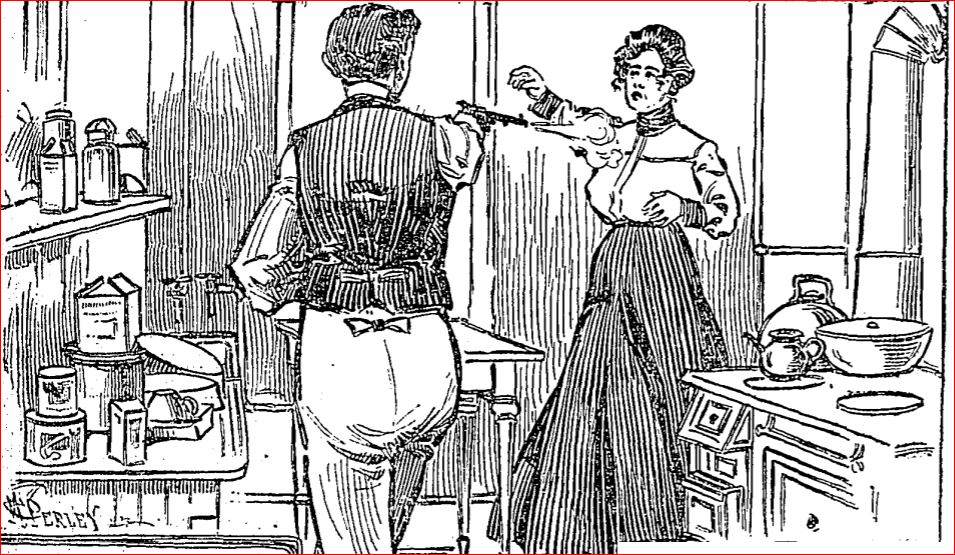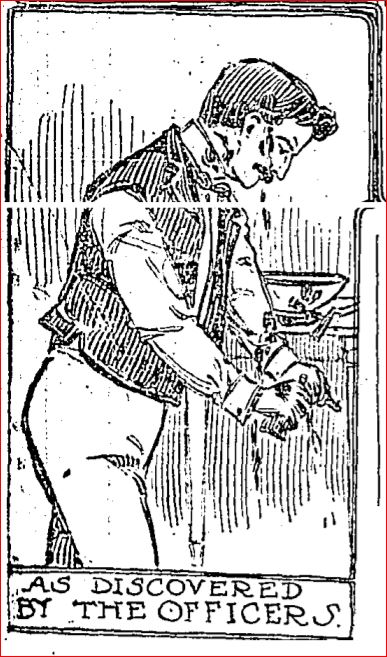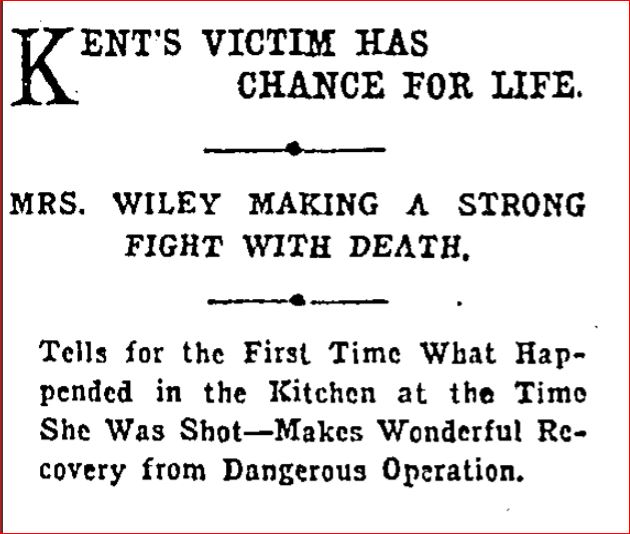February 15, 1901/ Columbia Boarding House/South Broadway, Los Angeles
Hattie Wiley and her three-year-old son, George, stood in the kitchen and they talked as she fixed his lunch.
George heard someone and turned to see D.C. Kent, Hattie’s former fiancé and co-owner of the boarding house, enter the room. Hattie turned from the stove to face D.C. and they argued about her recent decision to end their relationship, both personal and professional. D.C. brought up a revolver he had concealed in his pocket, leveled it at Hattie. and fired three rounds. George, who stood between the two, escaped injury as the bullets whizzed over his head.

Stunned and bleeding, Hattie screamed and lurched into the hallway dripping blood. She collapsed on the floor and whispered, “My mother, my mother.”
George followed behind her. He cried, “Mommy, mommy, what is the matter?” She couldn’t respond.

Residents heard the commotion and crowded into the corridor. One chambermaid gathered her wits about her and phoned the police. Then everyone heard a sharp crack. Seconds later, D.C. reeled out of the kitchen, bleeding from his head. The blood ran down his face and soaked his shirt. He started toward his room at the top of the stairs.
Police arrived. The residents weren’t much help; they didn’t know what had happened.
An officer found D.C. in his room, He clutched a straight razor and stood over a washbasin filled with blood. Before the officer could intervene, D.C. brought the blade to his own throat and slashed. He stumbled against a trunk. The room was an abattoir.

Before D.C. could slice his throat a second time, the officer punched him. Dazed, D.C. dropped the razor. The cop grabbed D.C.’s arm and tugged him into the hallway. D.C. glanced over his shoulder at Hattie, who was still on the floor bleeding. George stood near her and wept, he begged his mother not to leave him.

An ambulance transported D.C. to a nearby receiving hospital where a doctor stitched him up. D.C., who had been mute during the ride from the boarding house, suddenly blurted out, “I’m sorry I didn’t succeed.” Then retreated into a silent sulk.
A reporter came to interview D.C, but he would not, or could not, speak.
Hattie went to the California Hospital where a friend of hers, Dr. C.G. Stivers, examined her. The prognosis was grim. She suffered three serious gunshot wounds. Two of them entered her chest, and a third went through the fleshy part of her arm. The bullets that entered her chest deflected into her liver.
While they waited to see if Hattie would live or die, detectives began their investigation.
When he was younger, D.C. was a well-to-do businessman in Burlingame, Kansas. For whatever reason, he turned to alcohol. Once he started drinking he couldn’t stop. At some point, D.C. summoned the strength to vanquish his demons. He pulled himself together and made a fortune in the dry goods business.
Material success didn’t satisfy him. D.C. was restless and told his wife that he was miserable in Kansas. He wanted to move away and start fresh–without her. He told her to consider herself a widow, and he walked out.
He moved to Oklahoma, and later to Los Angeles where he got into the real estate business and bought the Columbia boarding house with Hattie.
Local newspapers speculated about the couple’s relationship. That they were engaged, or had been, and were living under the same were roof suggested an intimacy that could ruin Hattie’s reputation.
Mr. Harrison, Hattie’s father, took offense at the rumors and tried to set the newshounds straight. He said,
“My daughter’s character is above reproach as anyone who knows her will agree, and although she and Kent lived in the same house for several months, there was never a whisper of anything improper between them. They were engaged to be married, but Hattie broke it off. She told me she learned that D.C. was immoral. She said he had grown repulsive to her, and that she did not love him. Knowledge of this, coupled with an insane jealousy, undoubtedly prompted him to attempt her murder.”
Mr. Harrison then explained how his daughter knew D.C.
“D.C. was a friend of Wiley, my daughter’s divorced husband, and at various times lived with her and her family, both in Oklahoma and at Tropico, in this State. About two years ago Hattie rented a ranch from D.C. in Tropico. He boarded with she and her husband, and the latter’s mother. After Hattie’s divorce she lived for a time in East Los Angeles. Last April she came to our home at Tonawanda, New York, returning in September to Los Angeles, where she immediately joined D.C. in the purchase of the lease and fittings of the Columbia lodging house. My wife and I lived at the place with them, and there was never anything improper between them. D.C. agreed that Hattie should conduct business at the lodging house while he would devote his attention to his real estate business. He failed to carry out this agreement and spent most of his time at the house. He was insanely jealous of Hattie and would become angry when any other man talked with her.”
As D.C.’s jealousy increased and became more out of control, the Harrison’s sent Hattie to Long Beach for a week. She returned home determined to sever her ties to D.C.
Hattie was unaware that while she was in Long Beach. D.C. hired a private investigator to shadow her. The P.I. observed Hattie with a man and they seemed enamored of each other. D.C. was enraged by the news — he decided to seek revenge.
Dr. C.G. Stivers performed a laparotomy on Hattie. A laparotomy is a surgical procedure in which the doctor makes an incision in the abdominal cavity. The doctors opened Hattie up and traced the two bullets lodged in her chest to assess the damage. A lengthy operation to remove the bullets would kill her, so they left well enough alone.
Despite the earlier dire prognosis, Hattie rallied. She regained her strength and doctors felt confident that, barring anything unforeseen, she would live.

While Hattie recovered, D.C. paced the floor of his room in the jail ward of the receiving hospital. His biggest fear now was that he would go to prison for the attempt on Hattie’s life.
He mulled over his options. There wasn’t much he could do – other than feign insanity.
NEXT TIME: D.C. Kent lawyers up.

That was extremely interesting can’t wait till the next part.
I love historical true crime and the fact that it’s LA is a huge plus!!! Miraculous that she survived in that day and age. Did D.C. shoot himself in the head?
Sandra,
I love historic Los Angeles crime too. I never tire of it. Isn’t it amazing that Hattie
survived? Yes, D.C. shot himself in the head, but it was a superficial wound.